Tuesday Feb 17, 2026
Tuesday Feb 17, 2026
Monday, 24 November 2025 23:36 - - {{hitsCtrl.values.hits}}
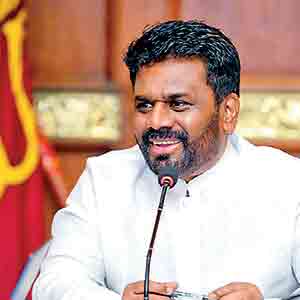
President and Finance Minister Anura Kumara Dissanayake
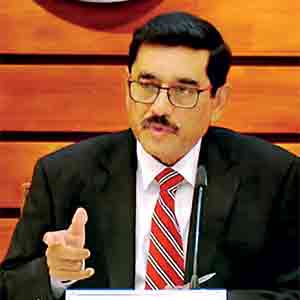
Central Bank Governor Dr. Nandalal Weerasinghe
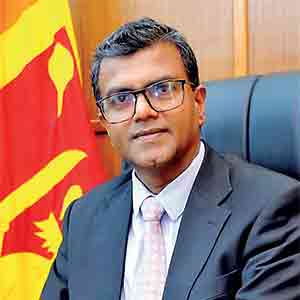
Treasury Secretary Dr. Harshana Suriyapperuma
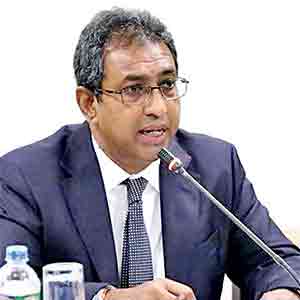
CoPF Chairman and MP Dr. Harsha de Silva
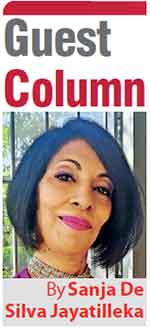 Is Sri Lanka due to face another economic disaster, or are we safe? While presenting the 2026 budget, the President assured Parliament and therefore the people, that we are absolutely safe. “Where’s the crisis?”, he asked taunting jovially, “What crisis?”
Is Sri Lanka due to face another economic disaster, or are we safe? While presenting the 2026 budget, the President assured Parliament and therefore the people, that we are absolutely safe. “Where’s the crisis?”, he asked taunting jovially, “What crisis?”
He seemed amused that anyone should think there was the slightest danger of such a thing. It looked rather like he had forgotten that we were just emerging out of one, so great was his incredulity at anyone suggesting even the whisper of any difficulty in paying our external debt, the cause of our 2022 default.
Among other things, he trotted out the fact that there was a balance of $ 6.2 billion in our reserves as evidence of our ability to meet our debt obligations.
Enter the Committee on Public Finance (CoPF). Its Chairman SJB MP Dr. Harsha de Silva posted the video of the meeting they had with the Central Bank, at which its Governor, Dr. Nandalal Weerasinghe was present, together with other senior officials. As the meeting progressed, the $ 6.2 billion reserve lost its shine rather rapidly. It turns out that not all of it was available for debt repayment, and in fact, as Dr. Harsha de Silva bemoaned later on a TV talk show, when the IMF formula for calculating reserves is applied, we don’t have any reserves at all, but a negative number. The host of the TV show was clearly dumbstruck, as are we all.
Although this was perhaps not headline news to economists, these little details are important to those of us citizens who eventually pay the price. We bother with these only because we paid the price once before, when we didn’t think we needed to ask the questions.
It turns out, the Central Bank has its own formula to come up with the figure for Foreign Exchange Reserves, which makes it less than the $ 6.2 billion cited in the President’s Budget speech. That $ 6.2 billion includes everything and the kitchen sink of foreign exchange related things, including short term dollar borrowings from local banks. ‘Short term’ is anything less than a year, and could be a risky 3 months. It also includes currency swaps from China and India, which cannot be used for debt repayment, besides having conditionalities for any kind of use whatsoever.
The Central Bank therefore removes the long-term currency swaps (currently with India and China), and other liabilities (currently a 2016 IMF bill for which they are responsible), when calculating the Reserves, which makes it a lot less than $ 6.2 billion. The CBSL leaves in the short-term borrowings from local commercial banks in the total, even though these are temporary borrowings and may not be available at the time our external debt comes due.
“That’s hot money!” exclaimed Dr. Harsha de Silva, with prompt agreement from MP Ravi Karunanayaka. “Why do we leave that in?” he asked. The answer from the CBSL Governor Dr. Nandalal Weerasinghe was beyond my understanding as a citizen. “If you don’t want us to leave that in, then we will have to do other market interventions, which will have their own implications” said the Governor ominously.
 It turns out, the Central Bank has its own formula to come up with the figure for Foreign Exchange Reserves, which makes it less than the $ 6.2 billion cited in the President’s Budget speech. That $ 6.2 billion includes everything and the kitchen sink of foreign exchange related things, including short term dollar borrowings from local banks
It turns out, the Central Bank has its own formula to come up with the figure for Foreign Exchange Reserves, which makes it less than the $ 6.2 billion cited in the President’s Budget speech. That $ 6.2 billion includes everything and the kitchen sink of foreign exchange related things, including short term dollar borrowings from local banks
Is leaving something in or out, discretionary? Aren’t there rules for what goes in and what stays out? Why did the Governor of the Central Bank say “If you don’t want us to…?” Earlier, an official had explained that as a rule, they leave in all short-term local forex borrowings. At least we now know that the $ 6.2 billion is nothing like what we were meant to believe. It seems to me like a big old bubble. Is it? Shouldn’t we ask, even though we are not experts? Was CoPF satisfied? I couldn’t tell.
IMF targets are not targets
The genie was out and wouldn’t go back in. The reserves were now under some scrutiny. The Central Bank was asked what steps have been taken to meet the IMF targets for reserves for the next year, and the year after, given that their figures would be very different with the relevant deductions. Dr. Nandalal Weerasinghe immediately denied that they were targets. “They are not targets; they are IMF estimates” he said. He further opined that they were far too high anyway. He said Sri Lanka did not need such high reserves, and they didn’t have such high amounts even when they paid their debts on time.
He said that the markets now have confidence in Sri Lanka’s management of the economy and therefore we didn’t require all that. The IMF also understood the Bank’s position, he said. Really? That’s great then. A bit confusing, though.
 The CBSL leaves in the short-term borrowings from local commercial banks in the total, even though these are temporary borrowings and may not be available at the time our external debt comes due.
The CBSL leaves in the short-term borrowings from local commercial banks in the total, even though these are temporary borrowings and may not be available at the time our external debt comes due.
“That’s hot money!” exclaimed Dr. Harsha de Silva, with prompt agreement from MP Ravi Karunanayaka. “Why do we leave that in?” he asked. The answer from the CBSL Governor Dr. Nandalal Weerasinghe was beyond my understanding as a citizen. “If you don’t want us to leave that in, then we will have to do other market interventions, which will have their own implications” said the Governor ominously
Usually, Dr. Harsha de Silva is well-informed but he didn’t know that the IMF targets were not targets, and that the IMF now understood that the reserves no longer needed to be that high. It’s CoPF’s job to ensure all this makes sense and everything is in good shape.
The Leader of the Opposition, Sajith Premadasa, very knowledgeable in economics (and especially development economics), had warned last year and then again several months ago, that Sri Lanka will have to go for another debt restructuring. Is he right? He has been right about some important things, and his pleas were ignored, such as timely ordering of medicines and masks for COVID-19. If he is right about this, the reserves will not be adequate to meet the debt repayments at the time they come due, and a debt restructuring will become necessary.
An expert economist friend reassured me that we have the expertise not to fall into default as such, again, but that the authorities may well go in for another restructuring. Unfortunately for us citizens, the consequences of another ‘restructuring’ are not significantly different from a default, apparently. We citizens will still have to pay dearly.
 The Leader of the Opposition, Sajith Premadasa, very knowledgeable in economics (and especially development economics), had warned last year and then again several months ago, that Sri Lanka will have to go for another debt restructuring. Is he right? He has been right about some important things, and his pleas were ignored, such as timely ordering of medicines and masks for COVID-19. If he is right about this, the reserves will not be adequate to meet the debt repayments at the time they come due, and a debt restructuring will become necessary
The Leader of the Opposition, Sajith Premadasa, very knowledgeable in economics (and especially development economics), had warned last year and then again several months ago, that Sri Lanka will have to go for another debt restructuring. Is he right? He has been right about some important things, and his pleas were ignored, such as timely ordering of medicines and masks for COVID-19. If he is right about this, the reserves will not be adequate to meet the debt repayments at the time they come due, and a debt restructuring will become necessary
So, the questions proliferate. Is the IMF satisfied with the level of reserves, current and as projected by the CBSL? Is the Parliament, including the Opposition and its leader satisfied that we will not have to go for a restructuring? Are the reserves calculated in accordance with the principle of consistency? Are they satisfied, given that Parliament has the responsibility for financial oversight, that we are on track to pay our external debts and that there is no impending disaster?
I ask this for a good reason. When bankruptcy was announced in 2022 for the first time in Sri Lanka’s history by the Governor of the Central Bank, none were more surprised than those in Parliament. They had not been consulted. They were exposed as being in dereliction of their parliamentary responsibility for financial oversight, and seem to be still reeling from that shock.
Was the bankruptcy cat belled unilaterally?
Possibly feeling a sense of déjà vu at the CoPF hearing, MP Ravi Karunanayake asked the Central Bank why Parliament was not consulted before announcing bankruptcy in 2022. Did he fear another one was not out of the question and want to understand how Parliament was left in the dark then, so as to prevent a second such flaw in the process? Was he concerned that Parliament wouldn’t have the necessary time to intervene to change such a trajectory, before it was too late?
 What about other economic indicators? Are they on track? Is the Parliament monitoring them? Are our economy and its management really in such good form that the President can caustically query “What crisis?” What exactly does Parliamentary oversight entail and is it being observed?
What about other economic indicators? Are they on track? Is the Parliament monitoring them? Are our economy and its management really in such good form that the President can caustically query “What crisis?” What exactly does Parliamentary oversight entail and is it being observed?
If things go south, the independent CBSL will declare that they had a limited mandate, and limited tools to work with, and are hardly responsible for any possible failure. Not so Parliament. It’s the parliamentarians’ duty to ensure they look after the country’s financial health on behalf of the people who elected them
Why did NPP MP Lakmali Hemachandra jump in with alacrity at the CoPF hearing, to declare that there was no need to go into the past, that they should go from where they were into the future? The Governor, who was same Governor who had declared bankruptcy in 2022 via a press conference, could not answer after her intervention, which was a pity. It would have been useful to know why the democratic process was subverted to make such a consequential announcement.
Did Parliamentarian Lakmali Hemachandra want to take the conversation away from such a scenario because it is in fact a distinct possibility that another one could be coming which this government wants to keep hidden from the people? Why did she arrogate to herself the CoPF Chairman’s prerogative to decide what questions were permitted? Why did the Chairman, Dr Harsha de Silva himself let it go, without discovering the reason for such action, for which we are all paying?
 The unused trillions in our coffers that the President boasted about in his budget speech was clear evidence that allocations for new development were not undertaken. The World Bank and the IMF warned that those allocations need to be used for future growth and were concerned that none was undertaken by this administration
The unused trillions in our coffers that the President boasted about in his budget speech was clear evidence that allocations for new development were not undertaken. The World Bank and the IMF warned that those allocations need to be used for future growth and were concerned that none was undertaken by this administration
Is Parliament satisfied that such an eventuality would not take place in the future? Are the MPs keeping an eye on things as they are meant to? They would be well-advised to do their homework. The public was assured last time that domestic debt would not be affected in the restructuring. In reality, the EPF and ETF paid most dearly, far more than any other external creditor, despite calls for parity of treatment.
Parliament should familiarise themselves with the entire exercise and ensure we are on track as we are told. I had thought compliance with IMF benchmarks were a useful tool to ensure we were on track. Now, it appears that the Governor doesn’t think they are necessary. If so, what has replaced those benchmarks? Are there new ones, what are they, and is Parliament aware of them? How else would they evaluate the CBSL’s and the economy’s performance other than relying on the Governor’s word?
Another economist friend of mine works out that what we really have in usable reserves is $ 1000. Dr. Harsha de Silva for his part thinks it is in negative figures. Do we have solid and credible plans to get my young economist source called “unencumbered foreign exchange, not swaps, not credit lines, not IMF SDRs earmarked for budget support”, in order to settle external debt?
Is the Government’s only solution to our external debt issue, the piling on of more debt, in a vicious debt cycle, a “Ponzi scheme”, as a very senior economist described to me the current plan of this administration including the CBSL. What if they cannot roll it over, and have to pay sooner rather than later?
 When bankruptcy was announced in 2022 for the first time in Sri Lanka’s history by the Governor of the Central Bank, none were more surprised than those in Parliament. They had not been consulted. They were exposed as being in dereliction of their parliamentary responsibility for financial oversight, and seem to be still reeling from that shock
When bankruptcy was announced in 2022 for the first time in Sri Lanka’s history by the Governor of the Central Bank, none were more surprised than those in Parliament. They had not been consulted. They were exposed as being in dereliction of their parliamentary responsibility for financial oversight, and seem to be still reeling from that shock
The unused trillions in our coffers that the President boasted about in his budget speech was clear evidence that allocations for new development were not undertaken. The World Bank and the IMF warned that those allocations need to be used for future growth and were concerned that none was undertaken by this administration.
In further evidence that a ‘Ponzi Scheme’ of foreign debt from the private money markets was indeed their preferred path, MP Lakmali Premachandra, replying the Opposition Leader’s critique in Parliament, grandly stated that there was good reason for leaving those trillions in reserves, rather than utilising them for development. Her tone suggested that the Opposition was clearly too stupid to have grasped the obvious truth she was about to enunciate: that those trillions would enable the Government to borrow at relatively more favourable rates, because the reserves (held back from development) would indicate we weren’t desperate, we had options. Seriously? Not spending on development is a good thing?
What about other economic indicators? Are they on track? Is the Parliament monitoring them? Are our economy and its management really in such good form that the President can caustically query “What crisis?” What exactly does Parliamentary oversight entail and is it being observed?
If things go south, the independent CBSL will declare that they had a limited mandate, and limited tools to work with, and are hardly responsible for any possible failure. Not so Parliament. It’s the parliamentarians’ duty to ensure they look after the country’s financial health on behalf of the people who elected them.
Are they doing so? If they are, can they honestly answer the question, are we safe from another default or restructuring? By when will we be safe? If they cannot answer, could they begin the work which enables them to do so, urgently?
[The author worked for two decades in the corporate sector in the UK, including in the implementation of Sarbanes-Oxley at GlaxoSmithKline, London.]